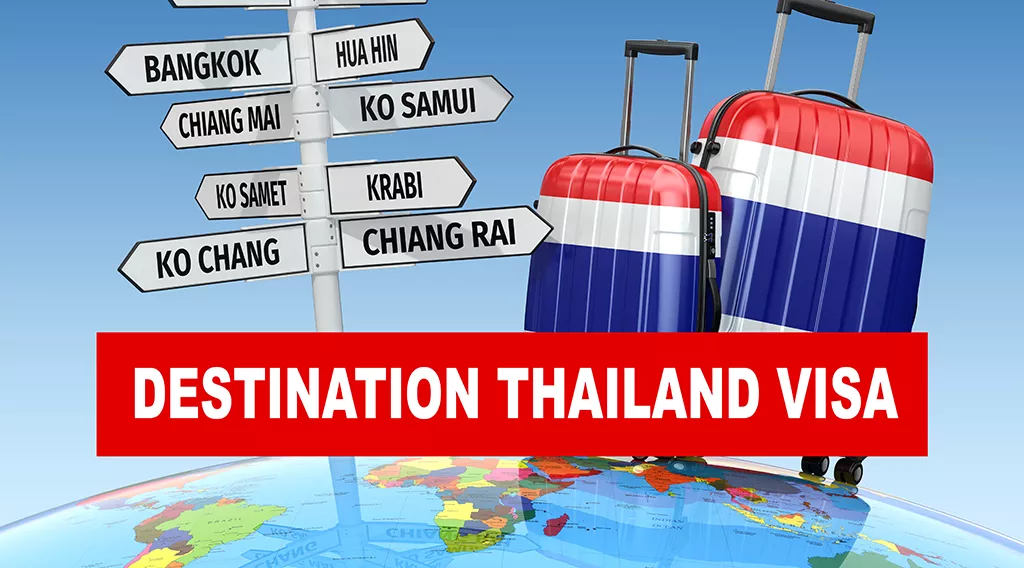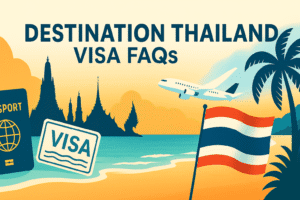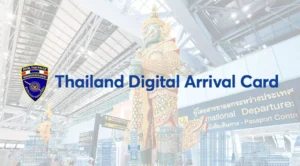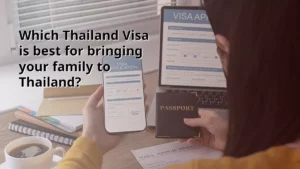In 2024, the Thai government introduced the Destination Thailand Visa (DTV Visa Thailand) to encourage more tourists to visit Thailand and boost its economy, which is great news for foreigners looking for a simpler long-term immigration solution. Obtaining this long-term visa will offer you a straightforward and affordable way of staying in Thailand without the hassle of strict eligibility requirements and high fees.
Please continue reading to learn more about the DTV Visa, its benefits, and how to apply for it.
What is a Destination Thailand Visa (DTV)?
Also known as the Thailand digital nomad visa, the DTV is a multiple-entry visa valid for up to 5 years, enabling you to remain in Thailand for up to 180 consecutive days per arrival. The DTV also provides the following benefits:
- The ability to enter and leave Thailand without a re-entry permit
- As the primary visa holder, you can obtain DTV visas for your dependent children and spouse
- Streamlined application process with minimal requirements
- It is more affordable compared to other long-term visa options at just 10,000 baht
- You can extend your 180-day stay limit, once per entry, for another 180 days (this will cost you 1,900 baht)
Given that the DTV is labeled as a tourist visa, you’ll receive the same restrictions as other foreigners such as not being permitted to work for a Thai company or apply for permanent residency in Thailand.
DTV Eligibility Requirements
While the DTV doesn’t come with many entry requirements, you still need to fulfill some conditions to get a DTV in 2025:
- You must be at least 20 years of age
- You must be able to pay the 10,000 baht visa fee
- You must hold at least 500,000 baht in your bank account (you can provide proof of this through bank statements, payslips, or sponsorship letters)
- You must have a valid foreign passport (with no less than 6 months validity remaining)
- You must be able to provide a passport-sized photograph of yourself (taken in the past 6 months)
- You must have no overstay history related to your visits to Thailand
- You must provide evidence of your current location (if applicable)
The DTV is also only available to foreigners with a specific background or purpose for wanting to visit Thailand. You can only apply if you fall under one of the following categories:
Workcation
One of the ways to qualify for the visa is to be a digital nomad or a remote worker employed at an international company. Holding the DTV lets you work for that company remotely and earn income while you’re in Thailand. You can also fulfill this criteria if you’re a freelancer with international clients. In order to apply, you’ll need to provide an employment letter or proof that you’re working for a foreign company.
Thai Soft Power Activities
You’re also eligible for the DTV if you’re enrolled in any of Thailand’s soft power activities. These are cultural and entertainment activities designed to add value to Thailand’s economy and increase awareness of its culture. Currently, you can be enrolled in any of the following:
- Muay Thai lessons
- Thai cooking classes
- Sport training sessions
- Educational seminars
- Music festivals
- Treatment at Thai medical centers and hospitals
To apply, you need to provide proof that you’re enrolled in a Thai Soft-Power Activity or a doctor’s letter to show that you will be undergoing treatment at a Thai medical facility or hospital.
Dependant of a DTV Holder
If you’re a member of a DTV holder’s immediate family, you may qualify for the visa. As of now, you’re only eligible under this category if you’re their spouse or an unmarried child under 20 years old. There is no restriction on the number of immediate family members the DTV holder can bring along with them. You also need to provide proof of relationship documents highlighting your connection to the DTV holder.
How to Apply for a DTV in 2025
You can acquire a DTV in two ways: in-person or online. However, you can only apply outside of Thailand, and depending on the country you’re applying from, you may need to provide proof of residence. Regardless of which method you choose, you’ll receive an electronic DTV stamp rather than a physical one.
If you’re applying in person, you must submit your application to a Royal Thai Consulate or Thai Embassy. To avoid complications or delays, it is recommended that you contact that embassy or consulate to schedule an appointment. If you’re currently in Thailand, you can travel to and submit your application in one of the neighboring countries (such as Cambodia and Laos).
You can also apply for the DTV online through the Thai E-Visa website. While you might have to endure lengthier wait times, you’ll obtain your visa without needing to schedule an appointment or travel to the embassy to wait in line.
IMPORTANT: Thai Embassies in some countries ONLY accept online applications, so call ahead before traveling.
What Changes Have Been Made to the DTV in 2025?
To increase the number of applicants for the DTV Visa, the Thai government has made some updates to the DTV program.
Online Assistance With Your DTV Application
The Thai E-Visa system is now being used by ALL Royal Thai Consulates and Embassies across the globe. So now you can not only apply online from any country with a Thai embassy but also get professional assistance with your application regardless of where you are, as visa agents in Thailand can now connect to the E-Visa system. If you’re not applying from your home country, though, you may need to provide proof of residence documents.
Thai Soft-Power Activity Limitations
The Thai government has clarified some conditions to the Thai Soft-Power Activity eligibility criteria. If you’re enrolled in one of the eligible activities, your participation has to be no less than 6 months long. In addition, you cannot satisfy this requirement if you’re enrolled in a language school as it does not fall under the Thai Soft-Power Activity criteria.
Financial Requirements
Thai embassies around the globe have made changes and clarifications to the DTV applications that are processed in their host countries.
- Paying the 10,000 baht application fee and holding at least 500,000 baht in your bank account are considered the bare minimum you’ll need for your financial requirements. Some embassies charge more for the visa fee, and/or require a higher amount than 500,000 THB in your bank account due to different economic situations and exchange rates.
- The Thai government stated that it only accepts liquid funds to meet the financial requirement, meaning that you can’t show 500,000 THB worth of stocks, bonds, crypto, or other non-liquid assets, it must be cash in a bank account.
Alternatives to the DTV
If you’re looking for an immigration solution that is even more flexible and comes with a wealth of additional benefits, consider the Thailand Elite Visa. The new Thailand Privilege Bronze membership is priced at 650,000 baht and is valid for 5 years, making it the most affordable out of all the Thailand Elite Visa packages.
Contact Siam Legal for DTV Assistance
If you want to secure your DTV quickly and without any hassle, reach out to our Thai visa consultants at Siam Legal. With over 20 years of experience in Thailand as a full-service law firm and visa consultancy, our team has the skills and expertise to ensure you can obtain your visa smoothly. We’ll help prepare your required documents and handle the submission of your application on your behalf, allowing you to focus on planning your journey to Thailand with peace of mind.
Thanks to the expanded E-Visa system, our team can help you no matter where in the world you apply from, and we’ll provide unlimited support until you have your visa.
Contact Siam Legal today to secure a swift and simple path to long-term stays in Thailand without fear of immigration issues disrupting your travels.










































4 Responses
Hi
I am interested in the DTV visa using a soft course. I see the course must be 6 months duration and prepaid, but I am confused about which Bangkok courses are approved for DTV. Can you help. Do you assist DTV applicants?
Kind regards. Greg
You can request a DTV consultation here https://www.siam-legal.com/visa-to-thailand/dtv-thailand.php
Hi, I am currently a guardian visa holder in Bangkok expiring 2nd of Oct 2025.
I plan to convert it to a DTV. How easy would this be? Thank you
Hello Joycen,
It’s not a conversion process. You’ll need to exit Thailand to end your current guardian visa status, then apply online for the Destination Thailand Visa (DTV) from outside the country. Once approved, you’ll receive a PDF confirmation by email, which you can print and present along with your passport when re-entering Thailand.